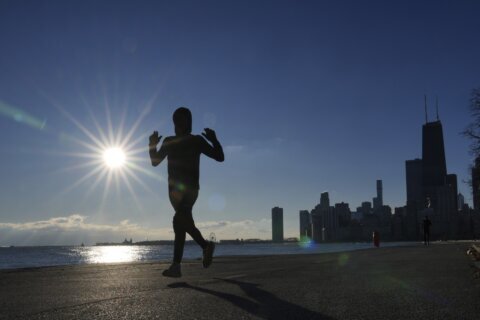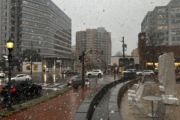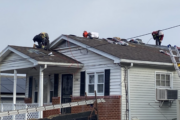The grassland birds that bring sweet song to North America’s prairie are in decline, with habitat loss, land degradation and climate change threatening what’s left of a once-vast ecosystem.
Over half the grassland bird population has been lost since 1970, and one-quarter of the species are in extreme peril. It’s a situation that biologists, conservation groups, farmers and ranchers would like to reverse — so they’re teaming up to do so. That means ramping up efforts to tag birds, track them, and foster best practices for land use that can aid their survival.
Here’s what else is happening related to extreme weather, climate and the environment right now:
—At least one tornado touched down in Michigan as severe storms downed trees and tore roofs of buildings. Five people died, including three in a single traffic accident amidst the storm.
— Maui County is suing Hawaiian Electric Company over the fires that devastated Lahaina, alleging that the utility should have shut off power as high winds hit in dry conditions.
—A year after floods devastated Pakistan, a United Nations report said an estimated 4 million children still need humanitarian assistance and help getting essential services. The report came even as massive evacuations are happening in the eastern Punjab province as monsoon rains cause new flooding.
—It’s winter in Brazil, but you can’t tell from the weather. A rare heat wave hit much of the country on Thursday, with highs reaching 41.8 degrees Celsius (107.2 Fahrenheit) in Cuiaba, in central-western Brazil. That came after Brazil last month had its hottest July since official measurements began in 1961.
— A California judge rejected an environmental group’s lawsuit seeking to block the state’s largest utility from trying to extend the operating life of the Diablo Canyon Nuclear Power Plant.
— Norway said it would spend 63 million kroner ($6 million) each year until the end of the decade to stockpile grain due to the COVID-19 pandemic, war in Europe and climate change.
QUOTABLE:
“About 75% of our athletes actually will tell you that global warming and climate change has, in one way or another, impacted on their competitive and training programs.” — Sebastian Coe, president of World Athletics, as athletes competing at the world track championships in Budapest, Hungary, coped with temperatures approaching 34 degrees Celsius (94 Fahrenheit).
___
Associated Press climate and environmental coverage receives support from several private foundations. See more about AP’s climate initiative here. The AP is solely responsible for all content.
.
Copyright © 2025 The Associated Press. All rights reserved. This material may not be published, broadcast, written or redistributed.






